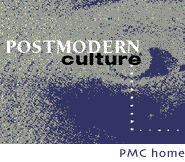
Abstracts
Volume 17, Number 1September, 2006
- Abstract: This essay is concerned with explaining the ethnic and gender contradictions in Guatemala as represented in two books, I, Rigoberta Menchú and Mulata, that are emblematic of this country's two Nobel laureates, Miguel Angel Asturias (1967 Nobel Prize for literature) and Rigoberta Menchú (1992 Nobel Peace Prize). The essay argues that both writersarticulate a politics beholden neither to the nation-state nor to transnational politics, but rather reorganize the ethnic question altogether through a process of "resemantization" that transforms ethnic identities in a way that destabilizes racial and gendered hierarchies. --aa
- Abstract: In their dialogue, Butler and Spivak discuss alternative subjectivities and state forms in a "global state." In arguing for the possibilities afforded by forms of belonging that are unauthorized yet exist within the state, Judith Butler suggests that the "right" to rights arises in the form of social discourse--calling for freedom is already an exercise of freedom. Gayatri Chakravorty Spivak disarticulates the identity of state and nation and develops the concept of critical regionalisms as a new analytics of power that rethinks territoriality and sovereignty. --Global States conference organizers
- Abstract: Taking its cue from the political rhetoric of the Bush regime, this article attempts to understand the complex relationships between neo-liberal free-marketism, evangelical faith, and the culture of life now at work in U.S. politics. It argues that the claims of unborn life are central not only to the sexual politics of the religious right but also to an understanding of postmodern U.S. nationalism, imperial power, and indebtedness. In this way, it attempts to explain how the seemingly anti-foundational tendencies of neo-liberalism are nevertheless haunted by recurrent bouts of sexual and moral fundamentalism. --mc
- Abstract: The notion of excess has for some years now served as a productively disruptive trope for feminist theories working to recuperate feminine desire and to outmaneuver patriarchal structures of containment. Yet a particularly derided form of excess that has not been as thoroughly redeployed to feminist ends is that of addiction or intoxication. While addiction has certainly been fully problematized--by feminist critics and many others--this essay works from the premise that such discussions have so stalled as to remain figurative: they study representations of addicted subjectivity in media texts, for example, or, more often, make addiction allegorical of other phenomena. This essay, conversely, analyzes the ontology of addiction as it is embodied by the female subject, and works to rehabilitate excessive drinking/drug use as another form of women's lived, embodied protest against patriarchal structures that work to contain subversive feminine desires. --klk
- Abstract: Two short films by Hong-An Truong juxtaposing Viet Nam's colonial past and its American war, with an introductory essay by film scholar Viet Thanh Nguyen. --ed
Arturo Arias, Constructing Ethnic Bodies and Identities in Miguel Angel Asturias and Rigoberta Menchú
Judith Butler and Gayatri Spivak, A Dialogue on Global States, 6 May 2006, at the Global States conference, University of California at Irvine, with an introduction by the conference organizers
Melinda Cooper, The Unborn Born Again: Neo-Imperialism, the Evangelical Right, and the Culture of Life
Karen L. Kopelson, Radical Indulgence: Excess, Addiction, and Female Desire
Hong-An Truong, Two Videos: The Past Is a Distant Colony | Explosions in the Sky and Viet Thanh Nguyen, "Seeing Double: Two Films by Hong-An Truong"
Copyright © 2006-1990 Postmodern Culture & the Johns Hopkins University Press. CONTENTS OF THIS ISSUE ARE AVAILABLE FREE OF CHARGE UNTIL RELEASE OF THE NEXT ISSUE. A TEXT-ONLY ARCHIVE OF THE JOURNAL IS ALSO AVAILABLE FREE OF CHARGE. FOR FULL HYPERTEXT ACCESS TO BACK ISSUES, SEARCH UTILITIES, AND OTHER VALUABLE FEATURES, YOU OR YOUR INSTITUTION MAY SUBSCRIBE TO PROJECT MUSE, THE ON-LINE JOURNALS PROJECT OF THE JOHNS HOPKINS UNIVERSITY PRESS.
